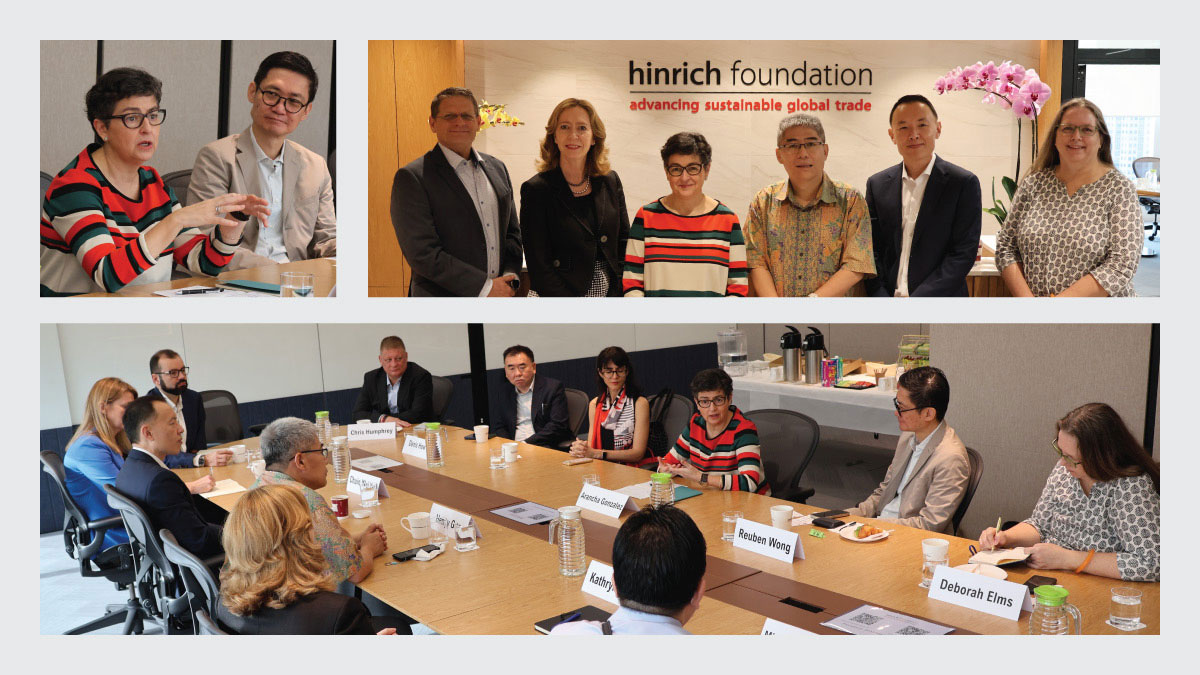Hinrich Foundation Roundtable with Arancha Gonzalez
Published 23 January 2024
The Hinrich Foundation organized a breakfast roundtable featuring Arancha Gonzalez, Dean of the Paris School of International Affairs at the French university Sciences Po. Participants from government, industry, and academia joined the event to discuss challenges in global trade policy.
(Text by Jia Hui Tee)
Arancha Gonzalez, formerly Foreign Minister for Spain, European Commission trade spokeswoman, chief of staff to European Trade Commissioner Pascal Lamy, World Trade Organization International Trade Centre's executive director, and United Nations assistant Secretary-General, among other distinctions, spoke at the Foundation at the invitation of the Foundation’s Advisor Henry Gao, who is on the advisory board of the World Trade Organization Chairs Program and Professor of Law at Singapore Management University.
In her remarks, Ms. Gonzalez highlighted the interplay of three important considerations shaping trade policymaking:
Geopolitics and security
Traditional schools of thought on achieving economic efficiency through international trade have been challenged by rising geoeconomic rivalry and the placement of national security ahead of trade interests. Geopolitical tensions between the US and China have resulted in the decoupling or “de-risking”, nearshoring, and friend-shoring of supply chains. Such geopolitical and national security considerations often contradict mutually beneficial economic exchanges, and hence deviate from efficient outcomes. In several instances, national security has also been used to justify policy measures outside the ambit of multilaterally agreed rules, including the implementation of trade restrictions.
Sustainability and climate change
Climate change can have severe repercussions on human life and trade. Increasingly, new trade policies with environmental objectives such as the European Union’s Carbon Border Adjustment Mechanism (CBAM) and the US Inflation Reduction Act (IRA) have triggered discussions on the nexus of climate and trade, and the approach under which climate and trade policy discussions can take place with a greater number of participants under a multilateral or plurilateral framework.
Industrialization
Adoption of industrial automation technologies and pursuit of export-oriented growth policies through rapid industrialization have placed environmental and social objectives in the backseat of trade policy considerations. Some economies are also concerned about overproduction and cheap imports from foreign countries that render certain domestic industries less competitive. Greater breakthroughs in AI technologies and quantum computing create uncertainty over job security and perpetuate a technologically-driven divide between social classes. Maintaining an inclusive growth strategy would be paramount to alleviating social tensions and help to keep markets open.
Participants discussed recommendations to mitigate divergences in trade policymaking and establish greater consensus in the global narrative on international trade:
- Reinvigorate international trade and promote the relevance of trade through research and frequent dissemination of trade statistics.
- Manage risk of policy divergence by leveraging the convening power of trade institutions. such as the World Trade Organization to start discussions on vital issues, e.g., digital trade and industrial subsidies.
- Use data and statistics to frame policy debates.
- Identify and address fundamental challenges faced by economies.
- Involve business and industry stakeholders more in trade policymaking.
© The Hinrich Foundation. See our website Terms and conditions for our copyright and reprint policy. All statements of fact and the views, conclusions and recommendations expressed in this publication are the sole responsibility of the author(s).

